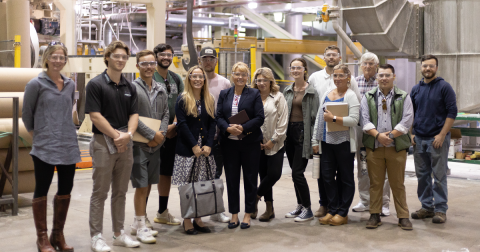PSU Partners with White Mountain Paper

Semester-long student project will conclude with formal presentation of recommendations
Plymouth State University and White Mountain Paper Company (WMPC) in Gorham, New Hampshire, have created a sponsored collaboration to identify potential future uses for the land currently used as a wastewater treatment lagoon for the mill’s operations, with a specific focus on the needs of the community. WMPC, in collaboration with the local municipalities, is currently exploring the viability of decommissioning the existing wastewater treatment lagoons in favor of a closed-loop connection to a municipal water treatment plant, which, if successful, could unlock approximately 40 acres of prime land along an area known as Cascade Flats for redevelopment.
PSU Associate Professor of Business Law Chantalle Forgues, JD, LLM, MBA, invited 10 students from various disciplines, including marketing, pre-law, finance, sociology and others, to participate in a semester-long course, Special Topics in Law and Entrepreneurship. The course is co-led by North Country native and PSU Instructor of Business Lisa Perras, MBA, CHI, and falls under the Innovation and Entrepreneurship Cluster. In keeping with PSU’s pioneering Cluster Learning Model, the course draws upon the expertise of community partners and resources from other disciplines such as economics, accounting, land use and French-Canadian culture.
“As students begin their exploration of the regulatory and zoning landscape of Gorham and Berlin and the potential economic and community benefits of this project, a common thread throughout will be the importance of team building and community consensus building,” Forgues said. “This collaboration will identify the actual needs of the community and ways to maximize the redevelopment of Cascade Flats.”
Students recently visited the paper mill facility and the approximately 40-acre parcel that currently contains the wastewater treatment lagoons. Over the next three months, they will research the permissible uses of the property and what would be possible to develop there, and they will poll community members and stakeholders about how they would like the land to be redeveloped. Students created the Facebook page “What Would You Do with the Lagoon?” and have already begun engaging the community.
On Thursday, December 8, the students will present their findings and recommendations for the best use of the property to WMPC and will invite state and local government officials and other stakeholders to attend a public presentation at the PSU campus.
“This special course in Law and Entrepreneurship is a perfect example of PSU’s Cluster Learning Model in action,” said PSU President Donald L. Birx, Ph.D. “Not only are students engaged in interdisciplinary study – working alongside peers from various disciplines – but by engaging students with the greater community they are gaining critical hands-on experience while building a network of contacts they’ll need to work and succeed in the real world. PSU is pleased to be working alongside WMPC on this exciting initiative.”
Behrens Investment Group acquired the mill assets of the former Gorham Paper and Tissue Mill out of bankruptcy on December 31, 2020, preserving more than 70 jobs in the community and sparing the mill from liquidation and permanent closure. White Mountain Paper crafted a strategic plan focused on implementing key initiatives relating to energy efficiency and environmental sustainability. These strategic initiatives will allow WMPC to be one of the most environmentally responsible paper mills in the country, while remaining competitive, reducing economic volatility, and allowing for future growth.
Managing member Evan Behrens is committed to finding sustainable ways to better operate the mill and to position it for long-term success and opportunities to grow.
“In order for all business to be successful and sustainable, it is critical that the surrounding community is healthy. While we see tremendous potential for this paper mill to become an industry leader in sustainability and overall environmental stewardship, we believe that much more can be developed onsite which could better the community and create strategic opportunities to solve for the region’s broader needs” Behrens said. “We are working in collaboration with Berlin and Gorham to develop a sustainable, modern approach to not only the wastewater treatment, but for the entire Mill property. We firmly believe that the community outreach and exploration efforts this select group of students are undertaking will help to advance the discussions and identify real opportunities that can be implemented, improving the overall viability of the community and the North Country as a whole.”
The city of Berlin, in collaboration with WMPC, has been awarded $100,000 from the American Rescue Plan Act (ARPA) to fund preliminary engineering work to explore the feasibility and initial costing of the proposed closed-loop system. This funding was pursued at the recommendation of former NH Department of Resources and Economic Development Commissioner George Bald, who acts as an advisor to WMPC, and with support of the New Hampshire Department of Environmental Services.
This project reflects PSU’s commitment to educate students to study and care for the environment, live a sustainable lifestyle and to promote sustainability to the campus community and the world beyond. PSU has made sustainability initiatives a priority first and foremost with its Sustainability Studies program, which incorporates interdisciplinary fields such as business, the social sciences, the arts and humanities, environmental science, and public health.

